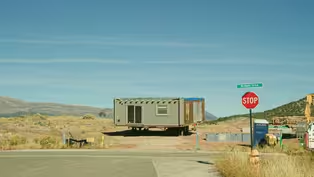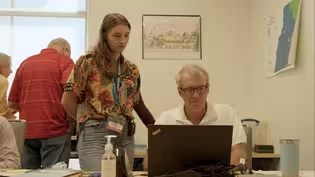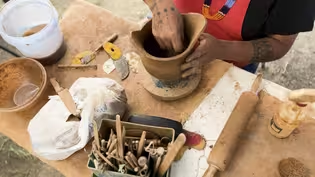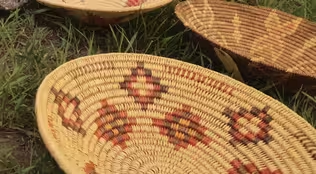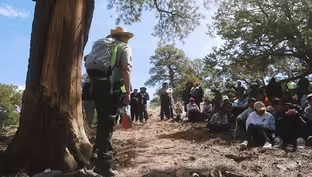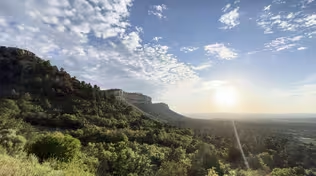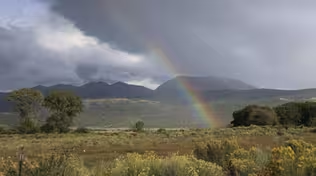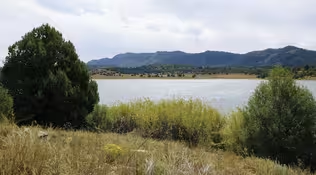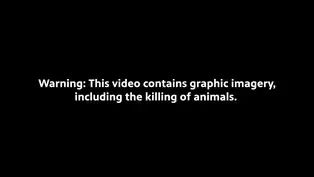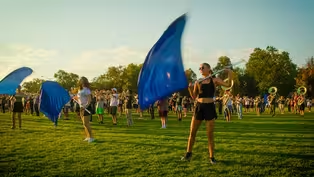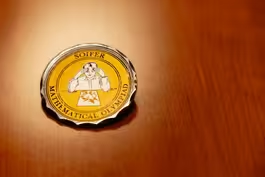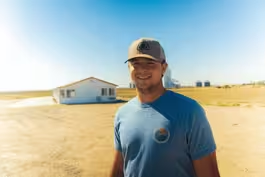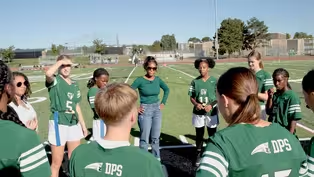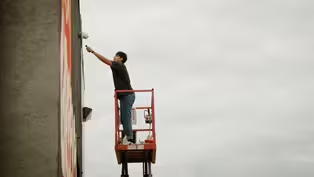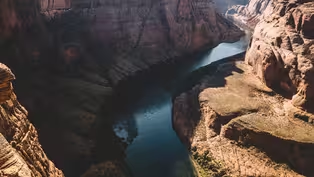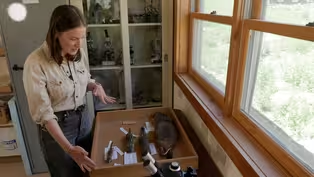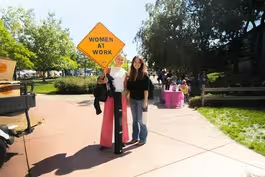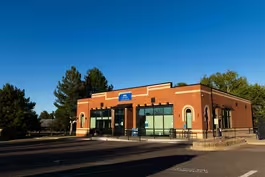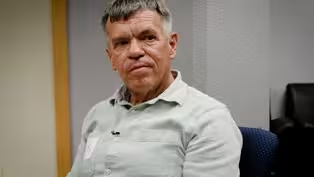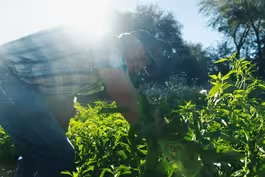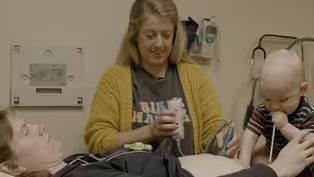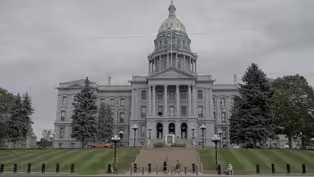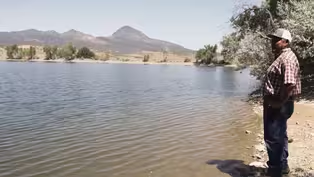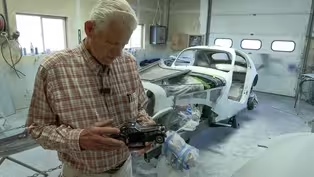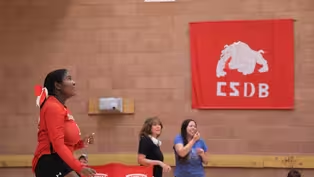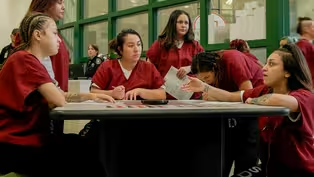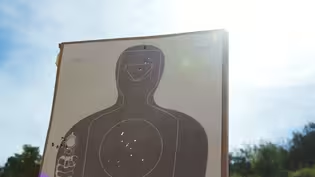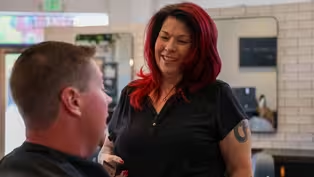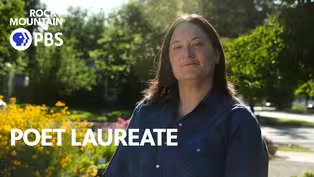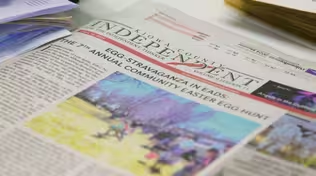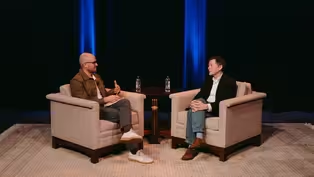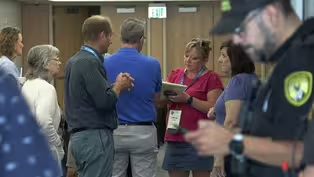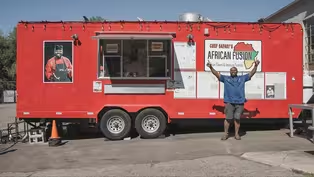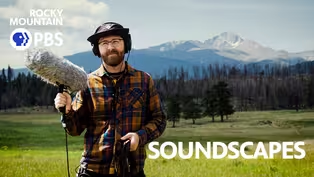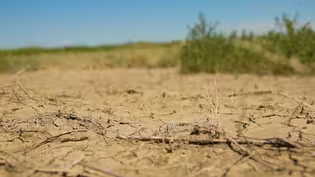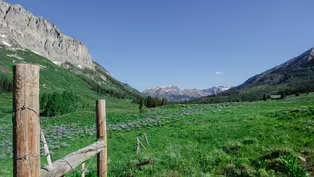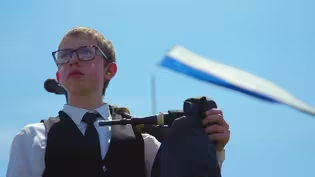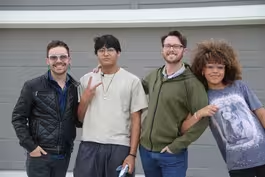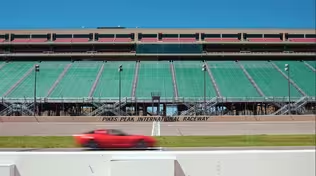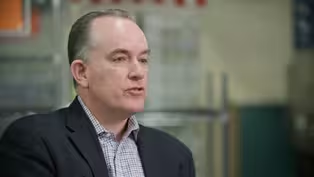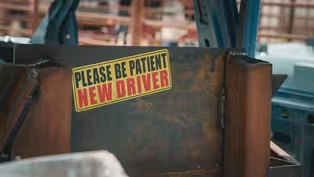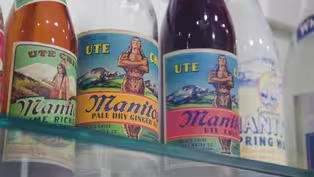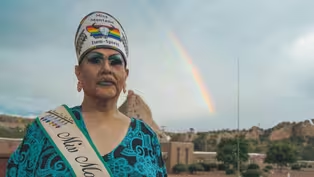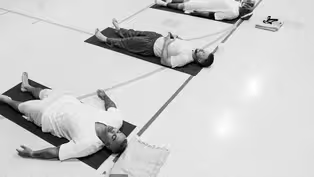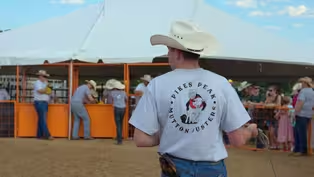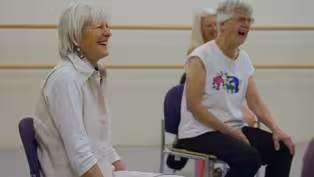A conversation with former U.S. Surgeon General Dr. Novello
Clip | 30m 31sVideo has Closed Captions
We sit down with former U.S. surgeon general Dr. Antonia Novello.
We sit down with former U.S. surgeon general Dr. Antonia Novello to discuss her new book Duty Calls: Lessons Learned from an Unexpected Life of Service.
Problems playing video? | Closed Captioning Feedback
Problems playing video? | Closed Captioning Feedback
A conversation with former U.S. Surgeon General Dr. Novello
Clip | 30m 31sVideo has Closed Captions
We sit down with former U.S. surgeon general Dr. Antonia Novello to discuss her new book Duty Calls: Lessons Learned from an Unexpected Life of Service.
Problems playing video? | Closed Captioning Feedback
How to Watch
is available to stream on pbs.org and the free PBS App, available on iPhone, Apple TV, Android TV, Android smartphones, Amazon Fire TV, Amazon Fire Tablet, Roku, Samsung Smart TV, and Vizio.
Providing Support for PBS.org
Learn Moreabout PBS online sponsorshipHello I'm Gabriela Resto-Montero the managing editor of Rocky Mountain PBS.
I'm here with Dr. Antonia Novello.
Dr. Antonia Novello became the first woman and the first Latina to become surgeon general of the United States in 1990.
During her tenure, Dr. Novello tackled childhood vaccination and developing AIDS treatments, among many other things.
Continuing her public service, Dr. Novello served as commissioner for the New York State Department of Health under Governor George Pataki.
Her new book, Duty Calls: Lessons Learned from an Unexpected Life of Service from FULCRUM.
Press recounts her life in Puerto Rico, how she became surgeon general, and the personal and professional lessons she learned along the way.
Welcome, Dr. Novello.
-Thank you.
Well, just to get started, for our viewers who are less familiar with the office, what role does the surgeon general serve in the nation's health?
Well, the surgeon general is really the eyes and the ears for the presidency with regards to what's happening in the country and health and needs.
And so it's a four year term is recommended by the president, but it is approved by the U.S. Senate for four years.
And so as of now, there's only been one surgeon general that has served two terms.
That was Dr. Koop.
And in 100 years, we have had only 21 surgeon generals and 7 of us, only are alive.
Are you in contact with any?
All of them.
-Oh, yes?
We do public policy roundtables.
When there is a subject that is important, then we all get together and we we go public and discuss it.
That's really good to know.
One of my favorite anecdotes of the book is when you talk about how instead of using sofa cushions outside of your office of Surgeon General, you used Cabbage Patch dolls That all had different disabilities to kind of test peoples personalities.
Were there any reactions from people that touched you or surprised you?
Well, I think it was very important for me to know who was visiting me.
There's always a different purpose for everyone that comes.
So I thought.
Let me use this as a surveyor of personalities.
And it was really interesting because I got every cabbage doll every kind of disability that you can think of, deaf, blind, with crutches.
And I put them in there instead of cushions, and I would look at the people from the corner of my desk.
And some of them would drop it.
Some of them will sit on them.
And some of them would put them in their lap until they got to see me.
And it was really interesting that the ones that dropped them were the first one who were crying.
I need I want, I deserve.
And I kept thinking the way you treated that, you're getting zero.
And so it was a learning experience because not too much for the judging of the people.
They are so nice when with politicos that can give you something.
But that, for me, was a nice way of screening.
That's a very good test.
You've had a very long public career in public service and you've been very professional and very private all throughout.
And one of the things that really struck me about this book is how open and candid and frank you were about your health growing up, about your marriage, about your professional career.
So what prompted you to, you know, be so open and be so courageous and in talking about your life?
You are not alone in this world.
So if I lied about it, There's always someone in this media world that we have today that would have talked about my life with more authority than myself and that I was not going to allow it.
And more than anything, it seems to me that I always believe in facts.
I have never talked about opinions, so why should my life be different?
Who did you write the book for and what do you hope they take away from that?
I think that as the years passed by and I realized some of my friends are dying suddenly, I figure what I remember to this moment, I have to put it in writing, because I see the youth is changing and the world is changing.
And so when I look into the way by which I can influence someone is basically: Don't do the mistakes I did.
And second, realize that there are gains and losses.
You follow the book.
You will be able to join me in doing not the bad ones the ones we're doing, the good ones.
but doing the good ones.
But I felt that it was almost every surgeon general has written a book and I said, I'm not going to be out there without one, being the first woman, following Dr. Koop and then being the health commissioner of the state of New York during September 11.
There are many things that sets me apart.
And for that reason I thought, let me just put it in writing.
And then I met Jill [S. Tietjen] and Jill put all my emotions into writing.
And for that reason, the book is really a terrific cohesiveness of feelings put into words.
What was that process like for you?
Were there moments where you felt a little bit hesitant or moments where you thought, I need to just say my piece?
It was really interesting.
I never dreamed I would write a book.
But then I started writing, hand writing, and all of a sudden it was just what was coming to my head.
The beauty of doing it with Judy is that she concisely precise it, but did not take away from the message.
And so there were times it was, oh my God, I said so much.
And then I would say, oh my God, but it's true.
And one of the things that I think is important to bring in to here is my husband was very sick and he died in March.
And so I read him the whole chapters in where he was being told of his misbehavior, and he said, Don't lie about it, It happened.
You have my permission.
So sometimes I wonder, you know, when the family sees that the book is there and we talk about all the situations in our marriage, that they might say, But the guys dead.
Why are you doing that?
And I figure just because he died, I ask his permission.
So I feel very, very free because basically it happened and he realized it and he says, It happened, so please go ahead and tell it, because we both learned lessons.
And I think it's important.
And one of the things in that book, too, that I thought it was important was every woman always dreams, if I ever walk into a house and I see my husband having an affair and I see the woman, am I going to kill her?
Am I going to stab her?
Am I going to pull her by the hair?
Am I going to... And that moment, all the things that you dream disappear because I remember the first thing I thought was, all those things came to my head, but I thought, Im still the wife in this house and I'm not going to lower myself to the lover.
So I turned around and I walked out of the house.
And this is the kind of content that the other surgeons general do not have in their books.
I hope not.
There's only two other women surgeons general and one is single, and the other one has been married, like they say in Puerto Rico, since Columbus put his finger down.
One of the themes that I picked up on that I thought was very interesting was that there were a lot of people who championed your career throughout the years, but there were also moments where you said that you would have hoped for or could have used guidance from a mentor.
And so for young women who find themselves in positions like what you were in, you know, when you were beginning your career, how would you encourage them or what do you have to say to them about finding mentors?
Well, the problem that I find when they are coming to me for mentoring is that they do not want to start at the base.
They all want to be me within one year.
So that reality is artificial.
And so that immediately starts thinking, but I'm getting too old, and I cant wait that long.
Sweetheart, then don't come to me for mentoring.
I did it exactly how it was expected, except that I became from a captain in the public service to a vice admiral within the moment that I became Surgeon General.
That was not a movement in fastness, as it was a leap in history.
You know what I mean?
But I think if I would have had a mentor, I wonder if I would have done much better.
Because I remember when I entered to take my my test for the medical school, I never knew that there was a Kaplan.
I never knew that you could study for a test.
I knew nothing.
And so I also learned that when you're in doubt, you get a second opinion.
Because when my name did not appear in the list of people who were to enter that class, I questioned it.
I questioned it, and I was not in the list, but I was in the list with my male counterpart name, Antonio instead of Antonia.
If I would have not been assertive, I would have not gone into the class and they would have eliminated that post or give it to an alternate.
So never be afraid to ask when you think that you are in the right asking for that.
There's ways and means.
You don't have to be crass, just assertive.
In your time as Surgeon General, you met with AIDS activists, and you felt that you found a lot of common ground there.
It's one of the most kind of moving stories in your book.
Can you tell us a little bit more about that?
Well, between Dr. Koop and myself, AIDS was rampant.
And during Dr. Koop, we were identifying them, and during my term, it was finding the treatment.
And there was ACT UP and the Quilt.
And so the benefits of the medication did not take away the anger of people having to say I died of pneumonia rather than I died of HIV/AIDS.
And so the Quilt became the expression of every emotion you ever dream of in a human being that was sick with the disease.
And I have never, ever had any difficulty with the gay community because I understand exactly their plea.
And so because in every job I have been I have had HIV/AIDS as part of my mantra.
And I remember I took a piece of the Quilt to my office and I put it at the entrance as I had my Cabbage Patch and my quilt of activism.
And so I heard the ACT UP people outside the door as they had gone to the NIH, to the FDA, everywhere, to clamor for respect and recognition.
And I remember that my office was the next one that was picked.
And when they came into my office, all of a sudden the person that was doing this stopped and saw the quilt.
By sheer coincidence or God blessed it had been his partner.
So he started crying because he realized that I had no negativism, and I had selected unknowingly his partner, which could have been anybody else's partner.
So he started crying.
And of course, I started crying too, because I felt he understood what I had put in there and I understood what it meant for him.
So I have never, thank God, have had any difficulty.
And I always remember when I went to New York the first day I arrived, there was one of the national meetings of HIV in Albany, New York, and they didn't want me to go speak to them at the level of the government.
They say, no, no, no, because the previous secretary of health in New York, they had had a big encounter and there was a moment where they even tried to do a slight little cut.
And so they didn't want me to get close to them.
So I said, I have never done any wrong.
They're about to meet me and I am not going to stop going.
So they said, Well, you're going to go with a complete cadre of policemen following you and you're going to enter.
I said, Not one of them is going to accompany me.
Well, then you're going to go through the kitchen and then we're going to be in the back.
I said, None of those.
So I went through the front and gave five minutes, impromptu.
And standing ovation.
And I said, Don't you dare hide between the fear of others just because they cannot deal with subject.
No, I had had never any difficulty.
And some of the times I used to kind of laugh silently.
So we used to go to dinner, four or five of us, and all of them with HIV/AIDS, and we used to go to restaurants and we used to start giggling, saying if they only knew, they probably would not want us here.
But by that time it was totally acceptance of them and of me.
And so when you ask me what was perhaps the best job I ever had, I truly believe Commissioner of Health of the state of New York goes up there.
Not only did I have the multiplicity of offices under my domain, but I also had the money to help them.
With $49 billion budget, one third of the New York budget, you really could not just promise.
You had the time and the money to deliver.
And that was crucial.
I think your assertiveness and your ability, I think your willingness, probably, to just if people are upset, you're going to meet them.
You're going to speak to them.
Also came up when they were protesting you, the abortion rights activists were protesting you.
The young girls.
Yes.
Yes.
At Barnard.
for closing the abortion clinic in New York State.
And so I wanted to hear a little bit more about that.
And also, since your time in New York and even as Surgeon General, now with a post-Roe world, you know, where do you see the landscape of reproductive justice?
Well, I don't think that just turning it off at the Supreme Court has turned it off in the states.
And so I am hopeful that the women's rights will prevail.
It might take time and it might be different from one state to the other.
But on the same token, it has not been erased.
It has just been kind of, in some areas, kind of almost too strict.
Maybe we open the Pandora's box.
And so I am confident that this will take its time, but it will not stay like that forever.
Just because the woman of today is not the women when Roe versus Wade was passed.
So when I went into New York, one of the things that happened is I closed an abortion clinic first month that I was there.
My goodness gracious.
It's almost like if I had closed the whole world.
The protests were intense.
And so I asked that the group that was protesting come and meet me and I'll tell you why I closed it.
So they did, in your face.
They came to see me and I said, Let me tell you why I closed that abortion clinic.
I closed it because there was an abortion every single hour or every single half hour in their clinic, and where they did not remove that piece of white paper under the first abortion and this place is full of HIV/AIDS.
That put them at risk.
Second, they only have a sphygmomanometer to take the blood pressure of women post-abortion.
One for 20 women.
No, you're not going to do that because what if they go hypertensive?
Are you going to wait until one recovers to put it in the other one?
No.
Number three, you are doing a suction machine abortion that is 1950 material, and that is pain.
So that's unnecessary.
You're closed until you get modern.
Oh my goodness gracious.
They were so pleased that I had to closed that clinic And so immediately everything started being done correctly.
But it was really interesting that it was the mayor of the city, the one who did not open it until he wanted it done on his name.
But for my part, I closed it.
And then so much of your work, is so, again, not afraid to jump into the fray and do what needs to get done.
Your motto of good science and good sense.
You know, you worked on iodizing salt.
That's quite a history.
Yes, that's quite a history.
Promoting childhood vaccines.
And a lot of that, recently, we were just talking before the interview, a lot of that has received a backlash recently.
I mean, you're a medical doctor and you were the Surgeon General of the United States, but an influencer on Instagram can say iodized salt is bad for you and then people will do that.
So I was wondering what your take is on kind of it feels as though a lot of the public health policies that were accepted have now been turned back.
We didn't have anti-vaxxers before.
Yes.
The United States had 67% vaccination when I was Surgeon General.
And we just moved it to be in the nineties and for that we got an award.
But the interesting part is that the generation had seen what the disease that was being prevented by a vaccine had done in the past without the presence of the vaccine.
So I had them on my side because they didn't want to go back into the influenza of 1919 or 1918.
So they understood perfectly.
On the same token, when I entered, after I left the post of Surgeon General, you have to put me in a position where I have a rank and respect because I am a career officer of the public health.
I am not somebody that got from a university, got the uniform and then went back to the same university.
No, I am a true career officer.
So to complete my 30 years of career, they send me to UNICEF.
When they send me to UNICEF, the goal was the plan for childhood for the 1990s, and one of them was iodizing the salt.
I remember when Mr. Grant who was the chairman at that time, told me, Tony, we're going to need the world to iodize the salt.
I say, Mr. Grant, have you heard about Morton's?
Because I thought, what is this?
But the arrogance was so intense that I said Mr. Grant, if you give me a good excuse, I might help you.
He says, Okay.
When you look at a person that has goiter, he says, don't look at that.
Look at the biggest damage of lack of iodine is mental retardation.
And that's the largest problem I have by not iodizing.
And I say, Okay, I understand.
Whats the second one?
He says, Tyrants in countries do not iodize so that they can control the multitude like if they were just passive.
I say, Were going.
Thats your mission.
Were going to do this immediately.
And it was really interesting.
The first place I got ionized was India and China.
And in India, I iodized the salt of the cows before I iodized the humans.
And in China, they iodized more than anybody immediately.
And so because Mr. Grant had been born in China as a son of people who were there doing ministering.
So yes the world got iodized.
It's one of those things that you don't think about.
You think Morton Salt, everyone has that.
but it makes a huge difference.
I thought he was going to fire me with the look he gave me.
Like arrogance.
No, but give me an excuse.
You know, what would you say then, you're still very much involved in public health, like you said, you keep in touch with the other surgeons general.
So what do you see as the biggest public health challenge of today, or what are the public health challenges of today?
Recently, we got together, the seven of us surviving at the University of Dartmouth because the new president is a psychologist, well-read and well-published.
And she wanted to make sure that that was her topic of importance upon her inauguration.
So we all went and talked about mental health.
That was the last thing we did of public policy.
Previous to that we did health disadvantages and the like.
But I truly believe that one thing that is worrying me right now is this feeling of equity.
Equity today, it seems to be the mantra of the world.
And I think that they do not understand what equity is all about.
They think equity is equality.
No, equality is the same for you and me.
Equity is according to my circumstances, what I can have.
Equity is equality with justice.
And for that reason, then I went ahead and read all the speeches of Martin Luther King just to see, because the most affected happens to be the African-American community.
And so I was asked to speak at an equity meeting who was equity today.
And I told him, Please, you cannot use equity today because you have to cover seven subjects before you can get equity to be equal in the African-American community.
And the more I read, its the same for the Hispanics and it's the same for the Native Americans.
Not so much for the Asian Pacific Islanders or the whites, but for the others, see, you have to have wealth.
There's a difference in wealth.
You have to have education.
There's a difference in education.
You have to have housing.
There's a difference in housing.
You have to have food.
Hunger in the African-American is twice.
And on top of that, they have food deserts and food swamps, no good food for eat and bad food enough to eat.
And so when you look into that, then you have this prison system in where in spite of the fact that African-Americans are only 13.7%, most of them are incarcerated, and most of them with long-term penalties.
And so it has been found that maybe 60% is because of their past history or all their criminal record, but 40% is for racism.
And so there was a Harris poll in 2022 that really showed that 47% of Americans do not believe theres racism in America.
17% are still unsure.
But 80% of African-Americans and Latinos believe that its truly present.
So one thing that really I feel equity is important is that there is research that shows that there's so many moments of microaggression to the to African-American community that is really now impinging on the children's development.
So when you hear every day that you're bad, you're bad, you are poor, you don't smell good, that starts accumulating.
So Dr. Geronimus at the University of Michigan discovered that those microbursts do accumulate and they destroy your immune system.
So there are many diseases that are responsible for people not to do well when they're in the African-American and the children are having cognitive problems, on top of the fact that most of them do not eat the vegetables and the fruits and there are consequences of that.
So it's much more important than than just being African-American.
Its their lives from the moment they're born.
And this is why when Martin Luther King says there are two Americas, the rich and the poor, and that tells the African-American get up from your bootstraps.
And they have to remember they had no shoes when they came in.
So having that speech, I really recommend it to Americans from Martin Luther King.
It gives you a sense of, get off out of your inaction, because God didn't mean for some of us to have so much and some others have so little.
You started your career in Puerto Rico, where you and I are both from, and I found it very kind of touching and sort of a full circle moment that after you retired, after Hurricane Irma, Hurricane Maria and the earthquakes of 2020, you returned to Puerto Rico to bring in medical infrastructure, to bring in treatment.
How did that feel for you?
And are you feeling more committed to returning?
I know that they tried to draft you to go into politics there.
Well, when I saw the hurricane coming, and I saw all the devastation of the island, I wanted to go there immediately.
But there were no airports in the island to receive me or in Orlando to send me.
So five doctors from the Adventist Hospital had already arrived in one of those airplanes, the ones that pick you in the ocean when you're transporting drugs.
So they got there and they told me that the one who got us.
And so I came to Puerto Rico and I realized the desolation God is great because the general that was in charge of all the disaster, I met him.
And so he made sure that I got everything that I needed, among them, helicopters.
So I didn't have to find all those hot electric things all over the way.
In helicopters, I visited 45 towns in one month and went directly to the Department of Health or to the hospital, and you could see people waiting.
The doctors were not there.
There was no electricity, but they were sick.
So with the five doctors, we did so much medical treatment.
And then we left the town and we went to the other one.
It was extremely fulfilling to help.
And so then I thought, okay, now we are okay.
And we went, and here comes the earthquakes.
And thank you God that I had already met the general in charge of this National Guard.
And he says, We're going to construct cities because the people were sleeping outside, they were afraid of the aftershocks.
We had never had one before.
And so all of a sudden the aftershocks were worrisome.
And so we decided to go with tents, put people in there.
Watch for their food, their health while this lasted.
And then when I thought everything was okay, then comes the vaccine.
So from 2017 to now, I go to Puerto Rico two weeks every month, depending on what is happening in the country.
And now happens to be, we have measles, we have COVID and we have influenza, and dengue.
But you're energized.
You're ready to go.
Because in Puerto Rico, it doesn't matter where I go, people really are very appreciative.
Ones because they realize its not my responsibility.
They have a Secretary of Health and the Department of Health.
But when they see me, they realize that I'm going to watch it like a hawk that it gets done.
And there are programs in television for which I can make public the deficits.
But because when you're on this side, you can't be too mean to the people who are doing it on the other side, because there are so many things impinging on your ability to do things, among them politics.
But since I don't have any contract with the island that pays me, I can speak my mind and they know that.
So my presence is seen by some as of some importance for getting these things done.
I guess it's interesting that you're still working in public service, but not in a political role.
No, I don't want it.
Yeah, right.
And you were again, very open in the book about the sour experience that you had in Albany after your term with investigations.
And I wondered did that, you know, did that really just turn you off completely for politics?
People had tried to draft you before to maybe consider you for other posts, but the work that you're doing in Puerto Rico right now kind of fulfills a little bit of that, but outside of a political framework.
I have the feeling that when I was in New York, many intelligent people in high level jobs have told me that they feel that that was the biggest case of entrapment they have ever seen.
Puerto Rican, Secretary of Health, terrific legacy what the department was leaving behind.
And all of a sudden you accuse me for having my driver take me here when all I did was buy presents for my people and really for their birthday.
But its okay.
Especially what irritated me more is that when I enter, I told the governor two things.
Never embarrass me for my job as Surgeon General, with anything that has to do with tobacco.
And secondly, and then he gave me a car, I said, You give me a car for me to do my things.
He says, Yes, that car is yours for what you want to do.
And then all of a sudden, Governor Spitzer is coming and the car takes another, and everyone in my department had a car, but I was the only one with a driver.
And so they use that to really take me on.
But it was really interesting that at the end they said, We haven't found anything.
She never gave a certificate of need.
I never pardon anyone for having done damage to a patient.
And I basically never became friendly with any hospital where if I found wrong, you have to pay a fine.
So in the absence of that, they only have to find that my driver probably had overtime and that I was using the car to go shopping.
I had no other car.
I need to eat.
But it was still a toll on you.
Well, ten years of it.
Yeah.
Ten years of it.
Which what is in the book, which is really interesting.
I never knew what was the reason for which they were punishing me.
I read it in The New York Times.
Never.
And when finally I found a lawyer in Christmas, by New Year's Eve, he called me and he says, Commissioner, it's too late.
The report against your behavior has been written.
And I said, How can that be written if I don't know?
That's the way it was.
So that was the end of politics for you.
That was the end of politics and the end of New York.
You are still going 100 miles per hour doing many different things.
So what is next for you and what do you most want people to understand about a life of service?
It may come unexpected.
Some label it service.
Some of them label it opportunity.
Depends where you are.
But I think when you do something for someone that they don't even know they exist, it's always very rewarding.
That's why I am a public health officer and I have a doctorate in public health because I believe that in public health you do goodness without having identifiers.
Its not here I am, look what I did for you.
They will never know I existed, but I know what I did.
That's why I like public health and service.
It makes me feel good that somebody benefits because I lived and they might not even know my name.
So that for me is very important and I don't feel I have finished.
That's why the book, the bucket, the book.
I think if somebody benefits because I lived, somebody benefits of my boo boos, then it was worth it to be transparent and real in that book.
But the other thing that I need more than anything, I need an academic chair because I believe almost all the surgeons general have it.
I don't.
And so I figure my curriculum vitae is no different from theirs.
And I might dare say that in some cases it is just a little bit better.
But, and I was number one following Dr. Koop.
So somewhere, somehow, an academic chair will appear and I will be very pleased.
And then I probably say the bucket list is close.
Well speak it.
Where would you be open to an academic chair?
Well, since this was my first visit to Colorado.
The University of Colorado Medical System?
Academic chairs are powerful no matter where they happen.
I just feel that wherever it comes from, it will attest to the fact that they honor what I have done in my life.
And for that reason, whatever it is, I will honor them as well.
Beautiful.
Thank you very much, Doctora Novello.
Brava!
Thank you.
When life gives you a house, move it.
Video has Closed Captions
Clip | 1m 30s | Owning a home had always seemed impossible. Then a historic cabin became available. (1m 30s)
Meet the election judges behind La Plata County’s voting process
Video has Closed Captions
Clip | 4m 26s | Selected community members in La Plata County began training as election judges. (4m 26s)
Sheldon Nuñez-Velarde: Master Potter of the Jicarilla Apache Nation
Clip | 5m 45s | The Jicarilla Apache honor their longstanding relationship to the natural world. (5m 45s)
Rowena Mora: Master Basket Weaver of the Jicarilla Apache Nation
Clip | 4m 27s | The Jicarilla Apache honor their longstanding relationship to the natural world. (4m 27s)
Plant Medicine of the Jicarilla Apache
Clip | 3m 27s | The Jicarilla Apache honor their longstanding relationship to the natural world. (3m 27s)
The Jicarilla Apache Creation Story
Video has Closed Captions
Clip | 4m 57s | The Jicarilla Apache honor their longstanding relationship to the natural world. (4m 57s)
Clip | 5m 37s | The Jicarilla Apache honor their longstanding relationship to the natural world. (5m 37s)
Ducklings Told to Protect the Lake
Clip | 2m 35s | The Jicarilla Apache honor their longstanding relationship to the natural world. (2m 35s)
Video has Closed Captions
Clip | 4m 58s | Inside the high-stakes world of competitive pumpkin growing (4m 58s)
Temple Grandin analyzes undercover video taken inside Superior Farms slaughterhouse Denver
Video has Closed Captions
Clip | 1m 54s | Undercover video taken inside Denver's Superior Farm plant with commentary from Temple Grandin (1m 54s)
The costuming family behind 60 years of handmade costumes in Colorado Springs
Video has Closed Captions
Clip | 4m 56s | The Saunders family once operated one of the largest custom costume shops in Colorado Springs (4m 56s)
Voters to decide fate of Denver's only slaughterhouse
Video has Closed Captions
Clip | 8m 14s | Superior Farms, the city’s only slaughterhouse, would be shut down if voters pass Ordinance 309. (8m 14s)
Keeping tradition alive with the CSU marching band
Video has Closed Captions
Clip | 2m 49s | Inside the Colorado State University marching band. (2m 49s)
After 40 years, one of Colorado’s most challenging math competitions may be coming to a close
Video has Closed Captions
Clip | 5m 19s | UCCS mathematics professor Dr. Alexander Soifer's Soifer Mathematical Olympiad turned 40 this year (5m 19s)
Behind the scenes at the Maurice Sendak exhibit
Video has Closed Captions
Clip | 3m 37s | Behind the scenes preparing for Denver Art Museum’s Maurice Sendak “Wild Things” Exhibit (3m 37s)
Video has Closed Captions
Clip | 3m 5s | The Kit Carson Café fills stomachs, job boards and the need for community gathering spaces (3m 5s)
Inside Colorado's newest high school sport: girls' flag football
Video has Closed Captions
Clip | 2m 44s | Inside Colorado's newest high school sport: Girl's flag football (2m 44s)
Painting a mural from start to finish
Video has Closed Captions
Clip | 2m 31s | Greeley painter, Alonzo Harrison, hits his stride in a new mural at WeldWalls festival. (2m 31s)
Video has Closed Captions
Clip | 2m 9s | Southern Ute Vice Chairman Lorelei Cloud explains the importance and sacredness of water to all. (2m 9s)
Video has Closed Captions
Clip | 4m 11s | Studying the ecological importance of ground squirrels at the Rocky Mountain Bio Lab. (4m 11s)
Video has Closed Captions
Clip | 3m 8s | Over 1700 elementary to high school girls explore careers in transportation and construction (3m 8s)
New suburban opioid treatment clinics aim to address a less visible need outside Denver
Video has Closed Captions
Clip | 2m 29s | Community Medical Services, an addiction treatment program, is opening six new suburban locations (2m 29s)
How Coloradans are working to overcome the political divide
Video has Closed Captions
Clip | 4m 8s | Braver Angels uses cross partisan conversations to overcome political divides. (4m 8s)
Chile farmer and cofounder of the Pueblo Chile & Frijoles Festival Dr. Mike Bartolo
Video has Closed Captions
Clip | 3m 21s | The retired CSU Fort Collins researcher has spent decades developing new types of chile peppers (3m 21s)
Colorado rural hospital relies on nurse midwives to provide quality care, keep costs down
Video has Closed Captions
Clip | 4m 30s | Call the Midwife: Colorado rural hospital leans on nurse midwives for quality care, lower costs (4m 30s)
How a measure makes it onto Colorado's election ballot
Video has Closed Captions
Clip | 4m 23s | Here's how an initiative goes from an idea to a ballot measure (4m 23s)
Water project advances Tribal sovereignty, lifts communities in Four Corners region
Video has Closed Captions
Clip | 3m 31s | A look at how The Dolores Project changed lives in the Colorado Ute communities. (3m 31s)
The secret collection in Rangely that they don't want to keep under wraps
Video has Closed Captions
Clip | 2m 38s | Everyone has a hometown, but not all have a car museum the size of a football field in them. (2m 38s)
For Colorado’s deaf high school volleyball players, the mindset is still the same
Video has Closed Captions
Clip | 4m 39s | The over 65 year-old volleyball program for deaf students starts the high school season (4m 39s)
First-of-its-kind mandate requires in-person voting in Colorado jails
Video has Closed Captions
Clip | 3m 33s | This election, every jail in Colorado will hold an in-person voting event for eligible voters. (3m 33s)
Why some Colorado schools have staff in firearms training
Video has Closed Captions
Clip | 5m 52s | Schools, particularly in rural areas, consider training and arming school staff (5m 52s)
This Denver barbershop is staffed by formerly incarcerated barbers
Video has Closed Captions
Clip | 2m 51s | R&R Head Labs hires formerly incarcerated barbers (2m 51s)
Video has Closed Captions
Clip | 2m 42s | How poetry provided an outlet to Fort Collins Poet Laureate, Melissa Mitchell. (2m 42s)
Video has Closed Captions
Clip | 4m 36s | Local newsrooms in Colorado are shrinking at alarming rates (4m 36s)
Ken Burns on his new film, "Leonardo da Vinci"
Video has Closed Captions
Clip | 36m 7s | Ken Burns met with Rocky Mountain PBS to discuss his latest documentary on Leonardo da Vinci (36m 7s)
Election officials held a secret conference in Grand Junction amid security concerns
Video has Closed Captions
Clip | 2m 43s | As conspiracy theories and lies about elections spread, the job of county clerk gets more stressful. (2m 43s)
Chef Safari brings a taste of Africa to Durango
Video has Closed Captions
Clip | 3m 14s | Chef Safari brings African fusion cuisine to Durango, blending global flavors with cultural roots. (3m 14s)
Meet the sound artist who's exploring the symphony of nature at Rocky Mountain National Park
Video has Closed Captions
Clip | 3m 37s | Meet the sound artist who's exploring the symphony of nature at Rocky Mountain National Park (3m 37s)
Water to water, dust to dust in the Arkansas Valley
Video has Closed Captions
Clip | 4m 4s | Agriculturists unite with ag workers to sustain farms and farm towns in the Arkansas Valley (4m 4s)
Branching out: How one family’s science roots continue to spread
Video has Closed Captions
Clip | 4m 57s | The Inouyes have been doing science for more than 50 years up in Gothic. (4m 57s)
The Colorado Youth Pipe Band is training Colorado’s next generation of bagpipers
Video has Closed Captions
Clip | 3m 23s | The Colorado Youth Pipe Band is training Colorado’s next generation of bagpipers (3m 23s)
A Colorado LGBTQ couple's journey from foster care to adoption
Video has Closed Captions
Preview | 5m 9s | Meet this LGBTQ+ family and their journey through the foster care system (5m 9s)
NASCAR or family car? Street racers hit the track
Video has Closed Captions
Clip | 3m 50s | Can racing on designated tracks curb illegal street racing? Local police hope so. (3m 50s)
Video has Closed Captions
Clip | 4m 43s | Matt Crane explains why election results in Colorado are reliable. (4m 43s)
Inside the tight-knit family of demolition derby
Clip | 2m 47s | For decades, Greeley, Colorado has gathered to enjoy demolition derby. (2m 47s)
What’s the big deal about Manitou’s mineral springs?
Video has Closed Captions
Clip | 5m 13s | Manitou’s namesake water feature has shaped the town geologically, economically and culturally (5m 13s)
Somewhere Over the Rainbow: Pride and Drag in Navajo Nation
Video has Closed Captions
Clip | 4m 40s | On the last weekend of June, Navajo Nation celebrated Diné Pride at its capital. (4m 40s)
Video has Closed Captions
Clip | 5m 4s | Incarcerated students find physical and spiritual healing in yoga program (5m 4s)
Baa Baa Buckaroos continue Mutton Bustin’ tradition at Pikes Peak or Bust Rodeo
Video has Closed Captions
Clip | 4m 7s | The next generation of rodeo stars get their start on the backs of sheep (4m 7s)
Dancing with Parkinson’s, without limits
Video has Closed Captions
Clip | 4m 1s | Boulder residents with Parkinson's disease find relieve and community in free dance class. (4m 1s)
Providing Support for PBS.org
Learn Moreabout PBS online sponsorship
- News and Public Affairs

Top journalists deliver compelling original analysis of the hour's headlines.

- News and Public Affairs

FRONTLINE is investigative journalism that questions, explains and changes our world.












Support for PBS provided by:
